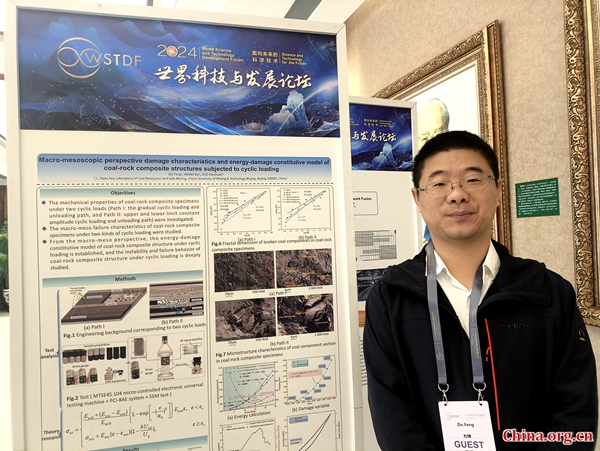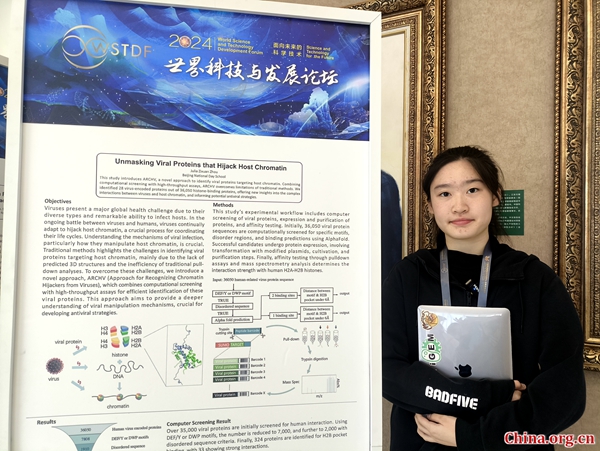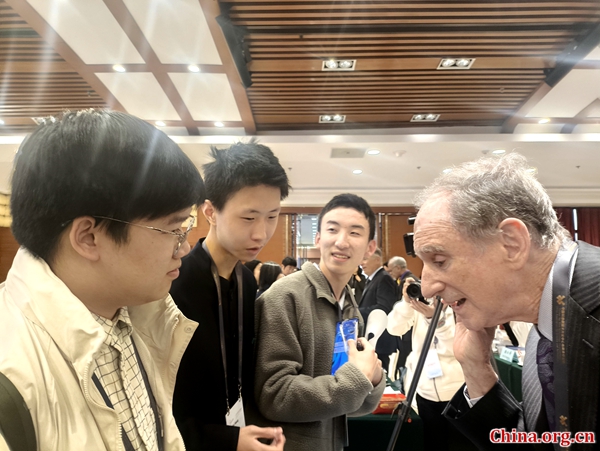
 0 Comment(s)
0 Comment(s) Print
Print E-mail China.org.cn, November 1, 2024
E-mail China.org.cn, November 1, 2024The 2024 World Science and Technology Development Forum (WSTDF) recently concluded in Beijing, offering young scientists and science reserve talent a platform to present their research and connect with international experts.
The forum, which ran Oct. 22-24, gathered scientists, scholars and emerging researchers from across the globe to discuss "Science and Technology for the Future." A dedicated interaction zone enabled young people to meet Nobel Prize, Turing Award and Lasker Award laureates, facilitating dialogue on cutting-edge topics.
Wan Gang, chairman of WSTDF 2024 and president of the China Association for Science and Technology (CAST), emphasized the importance of supporting young innovators during the opening ceremony.
"Innovation is the source of human progress, and youth are a driving force behind it," Wan said, adding that nurturing young scientists remains vital for the global scientific community.
Young scientists drive carbon neutrality research
At the interaction zone, Luo Tingwei, a senior engineer at Xiamen University's Carbon Neutral Innovation Research Center, shared his work on ocean carbon sequestration through microbial processes.
He explained the "Microbial Carbon Pump (MCP)" theory, which examines how microorganisms store carbon in the ocean. "Microorganisms convert active organic carbon into inert organic carbon, which remains stored in the ocean, contributing to long-term carbon sequestration," Luo said.
Luo stressed that negative emissions technologies, including oceanic carbon capture, are essential to address the current carbon emissions gap. Despite widespread emission-reduction efforts, he said additional solutions like MCP are needed to combat global warming.
The research combines climate studies with microbial analysis, using biological, chemical and molecular methods. Despite these complexities, Luo remained optimistic about future technological progress.

Du Feng, associate professor at the School of Emergency Management and Safety Engineering at China University of Mining and Technology (Beijing), discusses coal mine safety research at the World Science and Technology Development Forum's interaction zone in Beijing, Oct. 23, 2024. [Photo by Xu Xiaoxuan/China.org.cn]
Du Feng, an associate professor at the School of Emergency Management and Safety Engineering at China University of Mining and Technology (Beijing), highlighted his team's research on coal mine safety and clean coal utilization. His group works with international institutions such as Pennsylvania State University and the University of Queensland to develop equipment and cultivate talent, aiming to enhance coal mine safety and sustainability.
For young scientists, Du said staying grounded and diligent in research is as important, if not more so, than innate intelligence. He added that the forum offered a unique opportunity to learn from distinguished scientists.
Student researchers break ground in medical research

Zhou Zixuan, a senior at Beijing National Day School, presents viral protein research at the 2024 World Science and Technology Development Forum's interaction zone in Beijing, Oct. 23, 2024. [Photo by Xu Xiaoxuan/China.org.cn]
The forum showcased talent beyond professionals, featuring innovative work from high school students. Zhou Zixuan, a senior at Beijing National Day School, presented research on histone-blinding viral proteins. Using computational screening with high-throughput assays, she identified 28 human-related virus proteins that could successfully bind to the chromatin. This finding may potentially offer new insights into antiviral strategies.
Earlier this year, Zhou participated in the London International Youth Science Forum, which allowed her to connect with fellow enthusiasts from around the world, further broadening her understanding of cutting-edge science and technology.

Zhang Hongxi (L), a senior at Tsinghua University High School, speaks with Turing Award laureate Martin Hellman at the World Science and Technology Development Forum in Beijing, Oct. 23, 2024. [Photo by Xu Xiaoxuan/China.org.cn]
Another young researcher, Zhang Hongxi, a senior from Tsinghua University High School, presented research on central nervous system diseases, particularly multiple sclerosis (MS).
"The advanced biological research laboratory at Tsinghua University High School, where I acquired many fundamental research techniques, ignited my passion for biological research," said Zhang. "After joining the 'Yingcai Program (Science Talent Program),' I decided to take a break from school to fully commit to my research work."
In October of this year, Zhang attended the Neuroscience 2024 in Chicago, the annual meeting of the Society for Neuroscience, where he stated that he had learned a great deal of new knowledge.
Zhang's motivation stems from a personal experience volunteering at a hospital where he encountered patients with MS. Despite the disease's relatively low prevalence, he remains committed to the field. Looking ahead, Zhang plans to continue his pursuit in central nervous system diseases and neuroscience. For him, it's important to set clear goals, remain persistent, read extensively, and seek fresh perspectives to drive impactful innovation.
Both Zhou and Zhang's research efforts have gained support from the "Yingcai Program (Science Talent Program)," a joint initiative by CAST and the Ministry of Education. Launched in 2013, the program identifies and nurtures high-potential students, offering mentorship from leading scientists across 20 universities in 15 provinces, with disciplines ranging from mathematics to computer science.
International collaboration cultivates young researchers
The forum emphasized the role of international collaboration in advancing young researchers' careers. Rainer Frietsch from Germany's Fraunhofer Institute for Systems and Innovation Research and Sheldon M. Schuster, president of the Keck Graduate Institute in the U.S., stressed the importance of global scientific cooperation.
Frietsch called for expanded scholarships, research funding and job opportunities to help young scientists establish early career foundations.
Schuster highlighted the need for young researchers to address global challenges, including climate change, food security and water resources, saying these issues directly impact future quality of life. He also emphasized cross-border learning to spur innovation across cultures.
The WSTDF 2024 offered young scientists and science reserve talent a platform to showcase research and engage with renowned experts. These emerging innovators, tackling issues from climate change to disease research, demonstrated their commitment to advancing global scientific progress.
Go to Forum >>0 Comment(s)